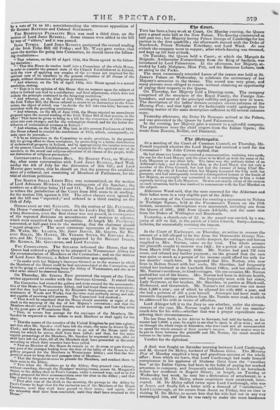In the Court of Exchequer, on Thursday, an action to
recover the amount of a bill alleged to be due from the Honourable George Nor- ton to Emmett and Co., livery-stable-keepers, for carriages and horses supplied to Mrs. Norton, came on for trial. The whole amount the plaintiffs sought to recover was 142/, for a period of ten months from March 1837 to January 1838. Mr. Norton had paid 7:31. into court, and refused any further payment ; on the ground that the sum was quite as much as a person of his income could afford his wife for ten months' coach-hire. It appeared that Mrs. Norton, who now lives in Bolton Street with her uncle, Mr. Sheridan, had frequently visited her husband at the Lambeth Street Office, and her children at Mr. Norton's residence, in hired carriages. On one occasion Mr. Norton pushed her out of the house. :sirs. Norton had been in delicate health, and required carriage exercise. She frequently went with her sister, Lady Seymour, or her brother, Mr. Sheridan, to parties at Black wall, Richmond, and Greenwich. Mr. Norton's net income was not more than 1,200 a year ; out of which he allowed his wife 400/. a year, and she had a pension of 50/. a year herself. Attempts had been made to reconcile the parties ; and letters from Mr. Norton were read, in which he addressed his wife in terms of affection.
Lord Abinger left it to the Jury to say whether, under the circum- stances of the case, Mr. Norton ought to pay 1421. for ten months` coach-hire for his wife—whether that was a proper expenditure con- sidering their circumstances— The late Dean Swift, in his Advice to Servants, had told the butler, as his master had 1,000/. a year, he ought to see that he spent it all in wine; and so on through the whole corps of domestics, who wev!each and all recommended to spend the whole amount of their master's income. If this maxim were to be put in force between the plaintiffs and Mr. Nurton, the result would be ruinous to the latter gentleman.
Verdict for the defendant.


























 Previous page
Previous page